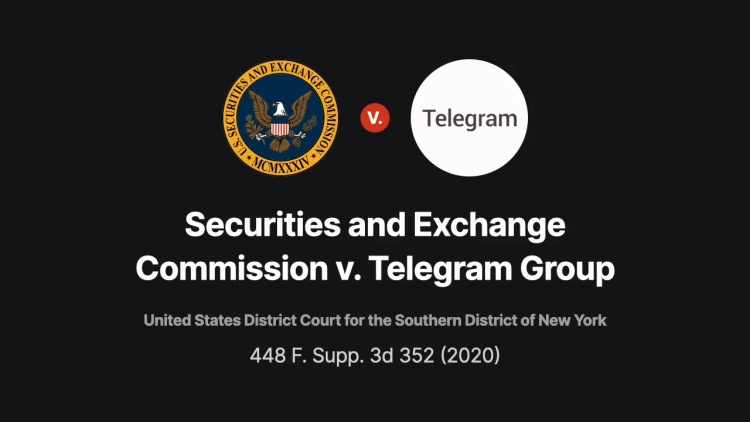Securities and Exchange Commission v. Telegram Group, Inc.
United States District Court for the Southern District of New York
448 F.Supp.3d 352 (2020)
- Written by Steven Pacht, JD
Facts
Telegram Group, Inc. (Telegram) (defendant) developed a new cryptocurrency called Grams. In 2018, Telegram raised $1.75 billion from sophisticated investors (initial investors) in exchange for Telegram’s commitment to deliver Grams at a discounted price when Telegram launched its new blockchain. The initial investors represented and warranted that they did not intend to resell their Grams. However, Telegram wanted the initial investors to resell Grams on a secondary public market so that Grams would become a mass-market cryptocurrency. Telegram acknowledged that its 2018 sales constituted securities sales but claimed that it did not have to file a registration statement with the Securities and Exchange Commission (SEC) (plaintiff) because such sales were exempt under § 4(a) of the Securities Act of 1933 and Rule 506 of SEC Regulation D. Telegram further asserted that anticipated resales would be wholly unrelated to the 2018 sales and thus would not involve securities. The SEC sued Telegram, alleging that the expected resales would make the initial investors underwriters and thus that no registration exemption applied to either the 2018 sales or the expected resales. The SEC moved for a preliminary injunction barring Telegram from distributing Grams to the initial investors.
Rule of Law
Issue
Holding and Reasoning (Castel, J.)
What to do next…
Here's why 907,000 law students have relied on our case briefs:
- Written by law professors and practitioners, not other law students. 47,100 briefs, keyed to 996 casebooks. Top-notch customer support.
- The right amount of information, includes the facts, issues, rule of law, holding and reasoning, and any concurrences and dissents.
- Access in your classes, works on your mobile and tablet. Massive library of related video lessons and high quality multiple-choice questions.
- Easy to use, uniform format for every case brief. Written in plain English, not in legalese. Our briefs summarize and simplify; they don’t just repeat the court’s language.





